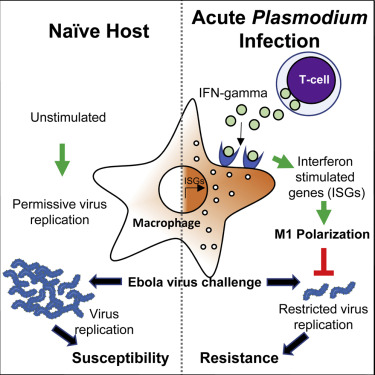Our official English website, www.x-mol.net, welcomes your
feedback! (Note: you will need to create a separate account there.)
Acute Plasmodium Infection Promotes Interferon-Gamma-Dependent Resistance to Ebola Virus Infection.
Cell Reports ( IF 7.5 ) Pub Date : 2020-03-24 , DOI: 10.1016/j.celrep.2020.02.104 Kai J Rogers 1 , Olena Shtanko 2 , Rahul Vijay 1 , Laura N Mallinger 1 , Chester J Joyner 3 , Mary R Galinski 4 , Noah S Butler 5 , Wendy Maury 5
Cell Reports ( IF 7.5 ) Pub Date : 2020-03-24 , DOI: 10.1016/j.celrep.2020.02.104 Kai J Rogers 1 , Olena Shtanko 2 , Rahul Vijay 1 , Laura N Mallinger 1 , Chester J Joyner 3 , Mary R Galinski 4 , Noah S Butler 5 , Wendy Maury 5
Affiliation

|
During the 2013-2016 Ebola virus (EBOV) epidemic, a significant number of patients admitted to Ebola treatment units were co-infected with Plasmodium falciparum, a predominant agent of malaria. However, there is no consensus on how malaria impacts EBOV infection. The effect of acute Plasmodium infection on EBOV challenge was investigated using mouse-adapted EBOV and a biosafety level 2 (BSL-2) model virus. We demonstrate that acute Plasmodium infection protects from lethal viral challenge, dependent upon interferon gamma (IFN-γ) elicited as a result of parasite infection. Plasmodium-infected mice lacking the IFN-γ receptor are not protected. Ex vivo incubation of naive human or mouse macrophages with sera from acutely parasitemic rodents or macaques programs a proinflammatory phenotype dependent on IFN-γ and renders cells resistant to EBOV infection. We conclude that acute Plasmodium infection can safeguard against EBOV by the production of protective IFN-γ. These findings have implications for anti-malaria therapies administered during episodic EBOV outbreaks in Africa.
中文翻译:

急性疟原虫感染促进干扰素γ依赖性的埃博拉病毒感染抵抗力。
2013-2016年埃博拉病毒(EBOV)流行期间,埃博拉治疗单位收治的大量患者同时感染了恶性疟原虫(疟疾的主要病原体)。然而,对于疟疾如何影响埃博拉病毒感染尚未达成共识。使用小鼠适应的 EBOV 和生物安全 2 级 (BSL-2) 模型病毒研究了急性疟原虫感染对 EBOV 攻击的影响。我们证明,急性疟原虫感染可以防止致命的病毒攻击,这取决于寄生虫感染引起的干扰素γ(IFN-γ)。缺乏 IFN-γ 受体的疟原虫感染小鼠不受保护。将初始人类或小鼠巨噬细胞与来自急性寄生啮齿动物或猕猴的血清进行体外培养,可产生依赖于 IFN-γ 的促炎表型,并使细胞对 EBOV 感染具有抵抗力。我们的结论是,急性疟原虫感染可以通过产生保护性 IFN-γ 来预防埃博拉病毒。这些发现对非洲埃博拉病毒爆发期间的抗疟疾治疗具有重要意义。
更新日期:2020-03-26
中文翻译:

急性疟原虫感染促进干扰素γ依赖性的埃博拉病毒感染抵抗力。
2013-2016年埃博拉病毒(EBOV)流行期间,埃博拉治疗单位收治的大量患者同时感染了恶性疟原虫(疟疾的主要病原体)。然而,对于疟疾如何影响埃博拉病毒感染尚未达成共识。使用小鼠适应的 EBOV 和生物安全 2 级 (BSL-2) 模型病毒研究了急性疟原虫感染对 EBOV 攻击的影响。我们证明,急性疟原虫感染可以防止致命的病毒攻击,这取决于寄生虫感染引起的干扰素γ(IFN-γ)。缺乏 IFN-γ 受体的疟原虫感染小鼠不受保护。将初始人类或小鼠巨噬细胞与来自急性寄生啮齿动物或猕猴的血清进行体外培养,可产生依赖于 IFN-γ 的促炎表型,并使细胞对 EBOV 感染具有抵抗力。我们的结论是,急性疟原虫感染可以通过产生保护性 IFN-γ 来预防埃博拉病毒。这些发现对非洲埃博拉病毒爆发期间的抗疟疾治疗具有重要意义。











































 京公网安备 11010802027423号
京公网安备 11010802027423号